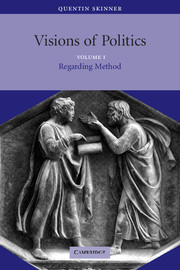Book contents
- Frontmatter
- Contents
- General preface
- Full Contents: Volumes 1–3
- Acknowledgements
- Conventions
- 1 Introduction : Seeing things their way
- 2 The practice of history and the cult of the fact
- 3 Interpretation, rationality and truth
- 4 Meaning and understanding in the history of ideas
- 5 Motives, intentions and interpretation
- 6 Interpretation and the understanding of speech acts
- 7 ‘Social meaning’ and the explanation of social action
- 8 Moral principles and social change
- 9 The idea of a cultural lexicon
- 10 Retrospect : Studying rhetoric and conceptual change
- Bibliography
- Index
3 - Interpretation, rationality and truth
Published online by Cambridge University Press: 05 September 2012
- Frontmatter
- Contents
- General preface
- Full Contents: Volumes 1–3
- Acknowledgements
- Conventions
- 1 Introduction : Seeing things their way
- 2 The practice of history and the cult of the fact
- 3 Interpretation, rationality and truth
- 4 Meaning and understanding in the history of ideas
- 5 Motives, intentions and interpretation
- 6 Interpretation and the understanding of speech acts
- 7 ‘Social meaning’ and the explanation of social action
- 8 Moral principles and social change
- 9 The idea of a cultural lexicon
- 10 Retrospect : Studying rhetoric and conceptual change
- Bibliography
- Index
Summary
Many historians make it a principal part of their business to investigate and explain the unfamiliar beliefs we encounter in past societies. But what is the relationship between our provision of such explanations and our assessment of the truth of such beliefs? The question is obviously a highly intractable one, but no practising historian can hope to evade it, as many philosophers have recently and rightly pointed out. Within the Anglophone tradition, the most eminent philosopher to highlight these issues of late has been Charles Taylor, and it is on his formulation of the question that I shall begin by focusing as I try to work my way towards my own answer to it.
The key issue for historians, as Taylor states it, is whether they should seek to avoid ‘taking a stand on the truth of the ideas’ they investigate. Is it desirable, or even possible, to ‘bracket’ the question of truth, ‘to insulate questions of historical explanation from those of truth’? My first response is that I am not altogether clear what Taylor means by the ‘bracketing’ of truth. Sometimes he seems to be asking whether historians should somehow seek to discount or set aside the fact that they themselves hold certain beliefs to be true and others false. If this is Taylor's question, then my answer is that I am sure no historian can ever hope to perform such an act of forgetting, and that in any case it would be most unwise to try.
- Type
- Chapter
- Information
- Visions of Politics , pp. 27 - 56Publisher: Cambridge University PressPrint publication year: 2002



